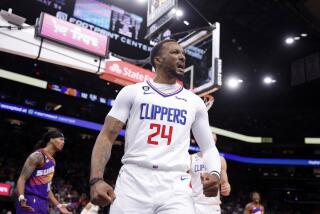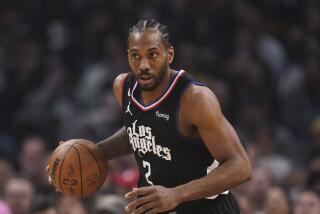Commentary : From Invisible to a Sight for Sore Eyes
- Share via
WASHINGTON — Here’s how close Jeff Malone came to being traded on Draft Day last June: If the Indiana Pacers, picking 11th, don’t select Reggie Miller, the Bullets, picking 12th, do. Feeling somewhat comfortable at shooting guard with Miller, the Bullets then send Malone and Jay Vincent to Denver for Danny Schayes and Fat Lever. The Bullets make this move to acquire Lever, the point guard they desperately need. Malone is available because over the last two seasons he’s shot 39.6 percent in the playoffs and the Bullets aren’t sure they can depend on him in big games. If Miller is there at 12, this is a done deal.
Goodby, Muggsy. Hello, Reggie.
Goodby, Darrell Walker. Hello, Michael Adams.
With Lever, the Bullets solve the problem that has plagued them throughout the 1980s. But Lever stayed put and so did Malone.
And without Malone, the Bullets are already out of these playoffs.
Follow all the spins, you get dizzy.
If my grandmother had wheels, she’d be a bicycle.
Jeff Malone has 99 points in three playoff games, 63 in the second halves, when games are determined. He’s shooting 59.1 percent, an impudent number for a guard. Whatever shackled Malone in 1986 and 1987 no longer binds him. He’s lifted his game above and beyond where his elevator normally stopped.
“I didn’t lead much,” Malone said, recalling past playoff troubles. “A lot of times I gave up my shot. I let things get to me mentally. I had to learn to be more aggressive offensively, because basically the people said, ‘Jeff Malone didn’t score.’ So I’m shooting more now. I’m taking more responsibility.”
To those who’ve charged he disappears during playoffs, Malone grins. “I’ve reappeared.”
There’s no question that as the Bullets chart Malone-O-Rama, going to Jeff, not Moses, is now the Bullets’ first option. Playoff defenses sag to the middle, surrounding centers. In the playoffs, a shooting guard either earns his money or steals it. On Monday night, Jeff scored 27 points after intermission. In the last eight minutes of the game, he was seven for seven. “I wanted the ball every time,” Malone said. “I felt I could take any type of shot and hit it ... runners, leaners, it didn’t matter. I just wanted the ball.” Every shot he took either tied the game or put the Bullets up by two. Big shots, every one with somebody hanging on him, every one of them buried. “He’s so pure as a shooter, and he can score with people on him. Do you believe the shots he was making?” marvelled Darrell Walker. “Walter Davis is a great shooter in the open court, but Jeff does it with guys on him.”
After the whirlwind game, general manager Bob Ferry, drained and jubilant, spoke admiringly of how Malone “accepted the challenge.” Assistant coach Bill Blair echoed that theme, saying, “He’s done everything you’re supposed to do. He’s been big time. There’s no question he can make jump shots. He’s done that in the past. But he hadn’t done it in the playoffs. Now he has. He’s learned that to be tough, you have to take big shots. Reggie hits his homers in October. Michael Jordan goes for 55 in the playoffs, when it counts. Maybe this is Jeff’s time.”
If it is his time, it’s about time.
The Bullets have been waiting for Malone to present himself as a Prime Time player. They might not have been willing to trade him had he shown this aspect of his game last playoff, instead of shooting a poochy 37 percent. Wes Unseld wouldn’t have laid Malone down for extended fourth quarter naps this season if he’d called for the ball the way he has against Detroit. Step two is making the big shot. Step one is taking the big shot.
“Last year was a real bad series for me,” Malone said, admitting it stayed with him, hovering like a predatory bird. “I read a lot about it. It was on my mind. I thought about it before the first game, especially since we’re playing Detroit again. I wanted to get past that first game and relax.”
Malone hit his first shot in Game 1, a good sign, but missed his next five. Last year, he might have stopped shooting altogether. Last year, he felt pressure from all angles. The point guards weren’t getting him the ball where he wanted, about 18 feet out on the wing, preferably the left side. Malone likes the ball there, because as keen a shooter as he is, he’s not a long-range bombadier. He prefers to take a few dribbles and then shoot, but if he has to go straight up, he needs to be within his comfort zone. Last year, the Bullets had two scorers, the Malones, and in the playoffs Detroit double-teamed them. Jeff had to shoot, anyway, so getting the ball in a bad spot compounded his dilemma. “Moses and I were forcing shots,” he recalled.
This year’s Bullets have a more varied look. Bernard King and John Williams have alleviated some of the burden Jeff bore, and their presence has deterred the relentless double-teams. Using picks, Jeff can now be freed to receive the ball where he wants it, and Walker and Steve Colter have been able to get it to him. “You see the difference in my game and everyone else’s, too,” Malone said.
In basketball, a player’s character is revealed by how he performs when the light is brightest, the scrutiny sternest. Everyone knows what Malone can do -- “I know what I can do, and if you’ve seen me over the years, you know, too” -- but would he do it in the playoffs? It’s rare and scary when a person is given the opportunity of redemption. On Monday, people asked Jeff Malone if his 35 points in Game 3 proved anything, and he said, “This whole series proves something.”
More to Read
Go beyond the scoreboard
Get the latest on L.A.'s teams in the daily Sports Report newsletter.
You may occasionally receive promotional content from the Los Angeles Times.










